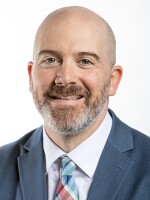RACHEL MARTIN, HOST:
The so-called bathroom bill in North Carolina has caused public outcry in and out of the state, and it's cost North Carolina a lot of money. Businesses and events have pulled out in protest over the law. North Carolina Republicans and the Democratic governor have now come up with a compromise that would repeal the law. Legislators are expected to vote on the new bill today. Reporter Jeff Tiberii of member station WUNC is covering this story, and he joins us now from the state capital, Raleigh. Hi, Jeff.
JEFF TIBERII, BYLINE: Good morning, Rachel.
MARTIN: Can you briefly remind us of how the bathroom bill, as it's known, came to be?
TIBERII: It came to be last March in response to an ordinance that came out of Charlotte, and that ordinance sought to give protections to members of the LGBT community, and state lawmakers superseded it. They enacted House Bill 2. They did it quickly in a one-day special session. And there has been a lot of economic and political fallout over the last 12 months - 12 months-plus now - because of it. It's been very controversial. They've been working on a deal for a while, and again, perhaps we have a compromise in place that will move forward.
MARTIN: All right, and what's in this new deal?
TIBERII: It's a three-part deal. It's not a stand-alone bill but rather an already existing piece of legislation that will be amended. Part one repeals House Bill 2. Part two is a preemption on bathrooms. And in layman's terms, that means that rules about multi-stall bathrooms will fall under the purview of the state. Localities can't govern bathrooms. Part three is a moratorium on cities until 2020. It means that no city or county in the state would be able to pass a nondiscrimination ordinance and provide any protections to the LGBT community until 2020.
MARTIN: So bottom line, can transgender people go into the bathroom of their choosing?
TIBERII: That's a good question. Sure, they can because there's no one that's policing this. This hasn't been an issue in North Carolina. There is no evidence that there has been a problem with transgendered people using the bathroom that corresponds to the bathroom with which they identify from a gender standpoint. There has been this law in place that mandates transgender people use the bathroom that corresponds to the sex listed on their birth certificate. So it essentially goes back to where things were before, and transgender people say that they do use the bathroom with the gender identity that they correspond with.
MARTIN: Yeah. So is this going to pass, this new repeal?
TIBERII: That's a great question. The governor, a Democrat, Roy Cooper, is meeting with Democrats from both the House and the Senate this morning. He's trying to whip the votes. It is unclear if they have enough votes to move this forward. It's going to be very close, and deals previously have fallen apart before. A deal fell apart in recent weeks. A deal fell apart back in December. So many eyes are on Raleigh today to see if in fact this compromise between Republican lawmakers and the Democratic governor can move forward. And we should note, the LGBT advocates, some of them have already spoken out against this bill. They say it is not good for civil rights.
MARTIN: Reporter Jeff Tiberii of member station WUNC, thanks so much.
TIBERII: My pleasure. Transcript provided by NPR, Copyright NPR.


